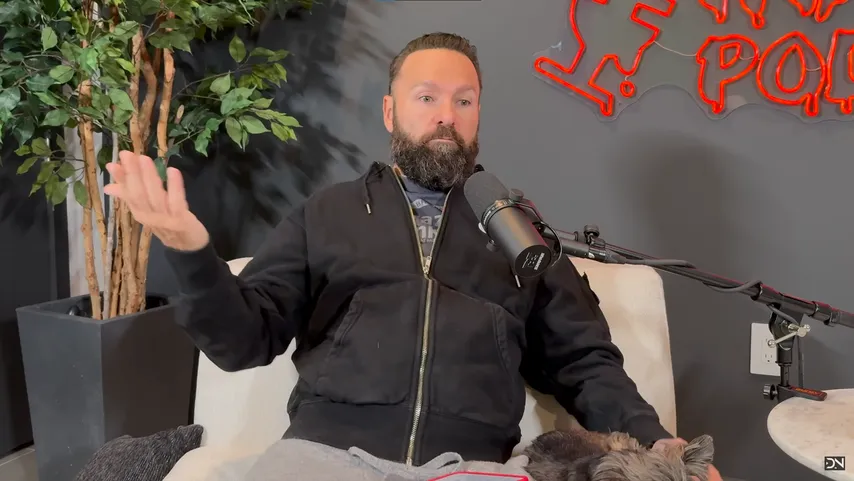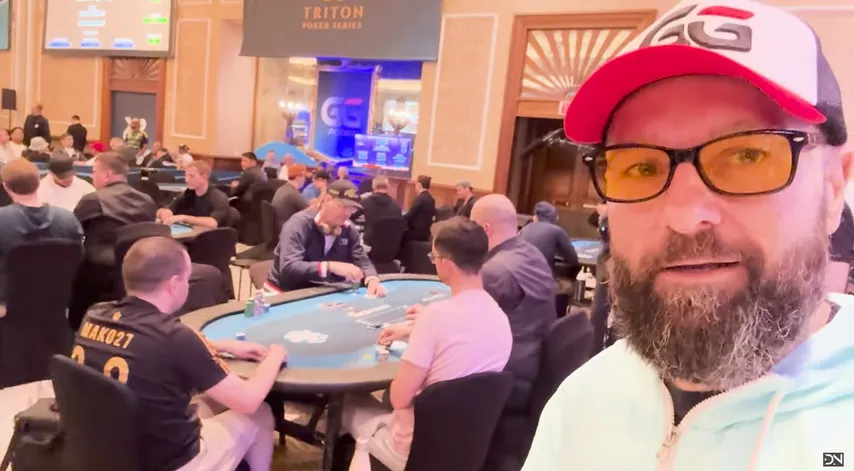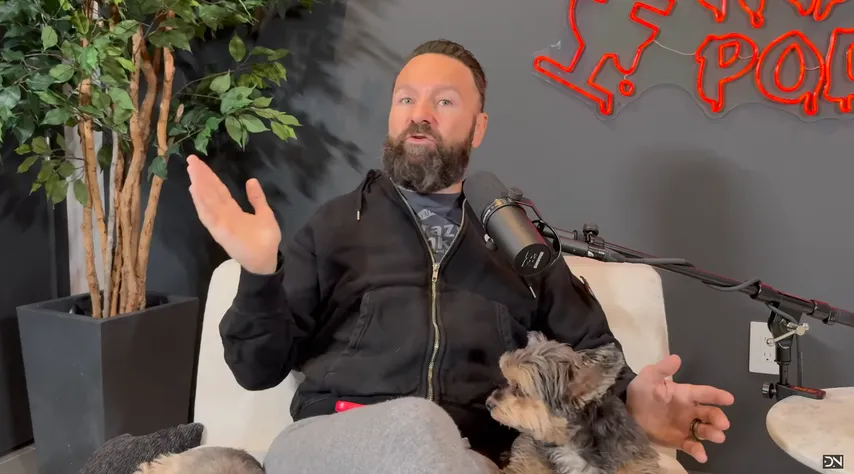All right, we're going to do an old-fashioned poker video. If you've watched poker over the last few years, you've probably noticed a trend where mostly pros, when they bet their entire stack—say they have 500k—will bet 495k and leave 5k behind. So what we're going to talk about in this video is why people do it and why I think it's an overall net negative for poker.
First and foremost, I should say this: for people that do it, there’s nothing immoral or cheating about it. I'm not suggesting they're doing anything wrong. What I'm saying is that it's one of those spots where if everyone chose not to do it—let's say, for example, to level the playing field—that would be better for the game as a whole.
For instance, when you think of stalling, everyone agrees that stalling is bad for poker; it's bad for the player experience and bad all around. But it's also very profitable. So what did we do in poker? We thought, "Let's try to curb it." One of the ways we did that is with shot clocks and time banks.
Again, it's a spot where I don't blame people for doing it because it's within their rights and within the rules, but something had to be done because it was becoming unbearable.

Recently, I just came back from the Bahamas; I was playing in the tournaments there and saw this come up twice in three days. I'm going to explain the situations—they're distinctly different but kind of the same thing.
In the first one, there were two pros: Mario Mosbeck and Jonathan Jaffe. We were in the 25k GG Super Main Event. On the turn—doesn't matter what the board is—let's say it's Queen-Eight-Six-Deuce. Mario Mosbeck bets 2.1 million and leaves a 5k chip behind. This is totally within his rights. Jonathan Jaffe, another top pro, thinks for a bit and calls, not realizing that it wasn't an all-in bet since this is on the turn.
Now Jonathan has Ace-Deuce (a pair of Deuces) and Mario has the best hand with King-Queen. The river is a Deuce! Now Mario gets to play with perfect information. I want to give Mario extra credit here because once he realized what was happening on the turn, he chose to throw in that other five-chip as well—not wanting to shoot an angle or take advantage of seeing Jonathan's hand.
But what he could have done—well within his rights—was wait for Jonathan to turn his hand up and see that he got rivered; then he saves that 5k chip. Why does that 5k chip have any value? Since the advent of the big blind ante, the value of that saved chip is worth far more than it is earned because that 5k could potentially turn into something like 80 or even 100k worth down the line. So, 20-to-1 for that last 5k chip.
Let’s start from the top and outline four key reasons why people do this:
The first reason: Let’s say you have 500k and want to bet it all; instead of doing that, you bet 499k. Why? When you're bluffing with something like six-high and your opponent raises you, you get to save a chip. The value you give up with that one chip is virtually nothing because adding it to your stack won’t make much difference in terms of your chances of winning. However, having that one chip left gives you a chance to re-enter the tournament if you were bluffing.
Secondly: This one's a bit more annoying from a poker perspective. If you're going all-in and there are potential pay jumps—say there are three or four tables left—you might bet 2 million of your chips while leaving a 5k behind. If someone else goes all-in after you, now you can stall for time; hopefully, someone else will bust out before you have to make your decision. If you do go broke after stalling, you've just made extra money from whatever pay jump occurred.
In Mario's example, that's what he was actually doing; I don’t think he was shooting an angle at all—he threw in the chip because he didn't want to think about pay jumps.
So those are some key reasons why players opt to leave chips behind when betting their stacks in poker tournaments. It’s a strategy that can yield advantages but also raises questions about fairness and sportsmanship in competitive play.
This is a profitable decision, right? It's not immoral to do this; it just kind of sucks for both the player experience and the broadcast. Imagine watching two tables and having some guy use four minutes of the clock, waiting for other people to go broke at their tables. It’s frustrating, and now the broadcasts have to fill that air explaining what he’s doing—not fun, not cool.

The third reason for leaving chips behind is a bit more annoying from a poker perspective. One of the other situations I mentioned involved Shaun Deeb; we were at the final table of a turbo tournament. He had 715k in chips, and with five players left, he moved all-in for 700k, leaving 15k behind. The non-professional at the table in the big blind made the call, turning up King-Ten. Shaun had King-Five or something similar, and when the flop came Jack-Ten, he realized he was drawing dead and decided to fold.
Now, Shaun got the advantage of seeing the guy's cards because if he hadn't seen those cards, he would have had to put his chip in regardless of the situation. Why is that relevant? First and foremost, Shaun actually just won the big blind and small blind—he went from having less than 10% of a blind to suddenly having two big blinds because he was eligible for the big blind ante.
The effect this has on gameplay is significant. There are other short stacks at the table; if Shaun goes broke in that hand, everyone else is freed up. But now that there’s a player left with just one chip, it affects how everyone plays.
This leads me to reason number four: for lack of a better term, we can call this collusion—legal collusion.
Anytime two players take actions that benefit both of them while hurting everybody else, that’s collusion by definition. It’s fine; we see this in spots where a player is all-in on a pay jump and maybe two players check down to the river so they have a better chance of knocking that player out. But this one-chip-back strategy presents another opportunity for collusion.
Here's an example: let’s say I'm the chip leader with six players left; I have 50 big blinds while everyone else has 10, 8, 4, or 3. On the turn, I have the nuts and my opponent has 600k in chips. Instead of betting my whole stack of 600k, I bet 595k. The player calls on the river, and I check back. Why would I do that? That 5k is mine!
This scenario creates pressure on other players at the table because now they’re under ICM pressure. Imagine having only ten big blinds and picking up Ace-Jack while this guy has one big blind left. If you just fold your hand, you might pick up an extra 15 or 20k from whatever the pay jump is.
It handcuffs those players and essentially benefits the chip leader because he gets to apply pressure while also benefiting the player with one chip left—who still has a chance to win a big blind ante or potentially ladder up.
So when eight people are at the table and these two players take actions that financially benefit both of them, that's collusion. I'm not saying it's immoral or wrong or cheating; it’s within the rules—but it is colluding because they’re both agreeing to do what’s best for each other.
As I said earlier, this has a significant effect on gameplay when these situations arise—whether it’s a mistake or a flat-out angle shoot like in Shaun's case. I'm not suggesting that his intention was malicious; however, angle shooting specifically means it's within the rules. If it’s not against the rules, then it’s just cheating.
Angle shooting pushes against rules that might be flimsy or open to interpretation, allowing players to take advantage of others—typically non-pros. In Mario and Jonathan Jaffe’s case, they were both pros; in Shaun's case, he was trying to capitalize on potential pay jumps worth around 11k.
So yeah, I've talked about stalling as an analogy—everyone agrees it's bad for the game—and we've tried to implement measures to help curb it.
Now, you can absolutely argue that you should leave the one chip behind because it's in your financial interest, and I agree with you—you're right. What you're doing is not morally wrong, etc. However, I just don't buy the idea that it somehow benefits poker if everyone does this. It is certifiably worse for the game.
As I mentioned earlier, you have stalling situations where players are all-in but wait for a pay jump. You also have instances where a player turns their cards face up, giving them that added bonus of information. Overall, you can't convince me that poker as a whole would be better off if everyone agreed to stop this practice. That never works, right? Expecting people to act in the best interest of others is unrealistic—poker is a very selfish game. Just like with stalling, everyone knows it’s bad for the game, but they think, "It’s my money; I have to do what I have to do." What am I supposed to say to that?
I'm not suggesting everyone should just do the right thing and burn money. What I'm proposing is that maybe there’s a solution here. I came up with one on Twitter; I'm not saying it's necessarily a good one—it just came off the top of my head. Something like: if you bet over 90% of your stack, you're considered all-in.

People argued that then players would just bet 89% of their stack or that dealers would have to count out how many chips that is. And I'm like, "Good! Because it raises awareness about the chips behind so that the other player doesn’t make a mistake." I think Tom Dwan actually tweeted something very simple that I agree with: in these situations—like with Jonathan Jaffe or Shaun Deeb—when a player says, "I thought he was all-in," and realizes he only has one chip behind, the floor should make a common-sense ruling asking, "What is your intention? What would you like to do?"
That way, even if the player initially said "call," they can still say, "Well, I want to raise," and then the chip goes in. This approach takes away that potential angle shoot opportunity if someone was doing it on purpose.
I was going to joke with people, but it’s true: I would bet a large sum of money that in 2025, if I do the one-chip-back thing, at least five people will turn their cards face up for me. That allows me to play with perfect information! I'm not suggesting that's the reason people do it; it’s just an added benefit.
Other players make mistakes too. Listen, I come from a place of personal responsibility—you know that from previous videos and discussions—but in this case, it feels like you're really benefiting from a total free roll.
So when should you leave one chip back? Based on current rules, the answer is always—literally always! There’s no downside; it’s a complete free roll. If it’s level one of a tournament and you have 30k chips, you bet 29k—the player turns their cards up and shows they have the nuts on the turn—you don’t hit on the river but get to keep that chip. No downside!
In theory, people say there are spots where you don’t need to do it—but you should because of that added bonus of potential information gain.
What ways can we fix this? The 90% idea is one option I had. Another suggestion—though it doesn’t seem quite fair—is to say any player with less than two big blinds is ineligible to win the big blind ante. That could serve as a punishment; if they ever do this strategy, they miss out on potential earnings.
However, what if someone just lost a pot and now has only one and a half big blinds? They’d be unfairly penalized for their situation. So I don’t know if that's the solution either.
Again, I'm brainstorming here! I'm trying to figure out ways to improve the game. I'm not saying everyone who does this is cheating or scummy; I'm just pointing out there’s no way you can tell me poker—whether as a player or as a viewer—is better off with people employing this strategy.
It is not. Nobody will tell you that they enjoy watching a player put in 99% of their stack and then sit there for four minutes, burning through time banks. Nobody likes that. The player doing it probably doesn't even enjoy it either.
Again, like I said, I don't have the solution, but on the note of shot clocks, I wanted to touch on that. Shot clocks are what we use to remedy stalling; it's the best option we have, but there is a far better alternative. For example, on GGPoker, all the time you use leading up to a final table dictates how much time you actually get when you're at the final table. If you wasted a bunch of time earlier, you’ll be on a short clock; if you saved your time, you’ll have more to make decisions.
At the final table, it’s not based on time levels; it’s based on the number of hands played. So, for instance, level 17 could be 25 hands played before moving on. This also helps with another issue: when there are a couple of short stacks in play, some players have an incentive to stall because they want that short stack to pay the higher blinds. By using a hands-played format, you eliminate that problem as well. It’s a win-win from that perspective.

Now, why use a chess clock instead of a shot clock? A shot clock punishes the wrong kind of players. It penalizes those who make quick decisions while rewarding those who take their time unnecessarily. For example, let's say you have a player who always takes the full 30 seconds for every decision while another player acts in five seconds every time. As the tournament progresses, the player who takes longer has burned up minutes while the fast player has conserved their time.
However, when the fast player is in a tough spot and needs to use their time bank—typically only taking two or two-and-a-half minutes—they find themselves out three time banks despite having used less total time than the slower player. A chess clock would fix this issue.
How would you implement a chess clock? There are many ways to do it. One idea I had is simple: let’s say everyone starts with a five-minute clock. Your clock starts after 10 seconds; if you want to take the full 30 seconds after that initial period, that’s fine—but you burn 20 seconds off your clock each time you do so.
If you run out of time completely, you're left with just 10 seconds for every decision until your next incremental minute is added back in. This incentivizes players to act quickly within that initial 10 seconds and imposes a penalty for wasting time later in the tournament.
This system punishes players who know what they want to do in seven seconds but decide to waste 30 seconds to balance their tells. Again, that's within their rights and rules, but it doesn’t reward players who act quickly when they should.
There are many ways this could be implemented; an app would be essential for tracking incremental added time and addressing stalling issues. I've always been anti-nit when it comes to poker strategies and gameplay.
So yeah, there are certainly ways we can improve how we manage timing in poker tournaments!
Okay, I hate nits. What's a nit? The definition has evolved over time. When I was a young kid, being a nit didn’t just mean you played tight; it meant you sucked every penny out of every spot without any understanding of how that impacts the game long-term or the people around you.
For example, when I used to start at the Bellagio, three pros would begin a game—an 8-16 game—just to open the store. They were trying to get a game going. The nits, on the other hand, wouldn’t play with them until someone bad came along. Then they’d say, "Oh, okay, now I’m going to play," and they’d fill the game. But as soon as that weaker player left, they wouldn’t even wait a second—they’d jump right out of there, making the guy feel like a piece of trash. It’s like that guy only played with them to suck from the pros who were there to start the games—the game starters who gave them this opportunity.
So I’ve always been anti-nit. Again, I don’t blame you for doing it; you're playing for a lot of money, especially at high stakes—you have to do what you have to do.


















